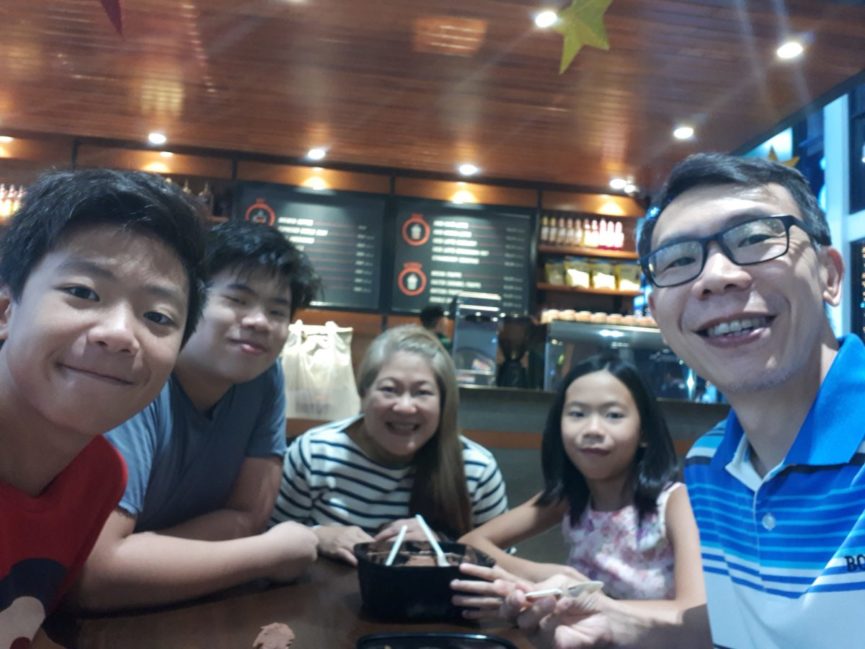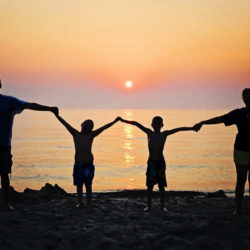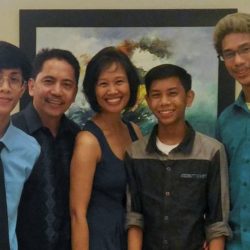The Tee Family
Richard Tee is an ordinary man. He’s a regular forty-something with a job that he goes to everyday. He gets tired, but pushes through for his family. He’s active in church, and tries to channel his faith forward, into the lives of the people he meets.
I had the chance to sit down with Richard and talk to him about his family, the trials of homeschooling his children, and his role and legacy as a father.
At first glance, the things most striking about him might be his height and long limbs, with his tall, almost lanky figure literally standing out from the general Filipino height. But what stood out to me as I talked to him was his spirit of gentleness, evident in his walk, in the movement of his hands, in the tone of his voice. With every mention of his family, he broke into a shy smile that was vulnerably honest. It reflected a popular, but often not followed, philosophy in life: to live in love, always.
Becoming a Father
Before he became a father, Richard’s main goal was simply to raise a family and let the children finish their studies, hoping that they end up doing well in something like a business. But when he knew for sure that he was going to be somebody’s father, he pulled himself together, attended seminars, and realized that his main goal was to build a godly heritage. “My intention from then on was to ensure that they become well-grounded in their faith in God. If that happens, all their obedience will be according to what God wants, not what I want.” His tone was filled with calm assurance.
With three of his children raised and schooled at home, Richard became an expert at creating family traditions which his kids looked forward to, eventually becoming important childhood memories. It was vital to him that they treasured their time together as a family. He limited his own time with his friends and barkada and focused on being with his children when he wasn’t at work.
Some of their traditions consisted of December vacations, Saturday dessert days, and ice cream all-you-can every Valentine’s Day. The Tee family was obsessed with ice cream. Dessert days consisted of trips to McDonald’s for floats and sundaes, or to Family Mart for their Twirl All-You-Can’s—something that the Tee children mastered making. “We laugh every time we see people’s ice creams fall,” he joked.
The first Valentine’s Day they had ice cream all-they-could, the entire family ended up with upset stomachs. They researched the ingredients of ice cream and found starch to be the main villain. “So the following year, we made our own ice cream using fruits, milk, and gelatin—without the starch.” They did so the following year, and the year after that. “That’s how they learned to make their own ice cream. It’s part of learning.”
Homeschooling
Their time together isn’t all fun and games, however, because Richard and his wife are also their children’s teachers. “Discipline is really the challenge,” he explained. “Sa homeschooling, pag medyo tinamad na, actually, pag ‘yong nagtuturo ‘yong tinamad, may delay ‘yong activity. And since there’s a lot of familiarity between the teacher and the child, nagkakaroon din ng stress because we are too accustomed sa performance nila sa test is what we are after.”
Later, Richard taught his children with the concept of multiple intelligences in mind, and started to appreciate the strengths of each child. “We shouldn’t be after their performance,” he stressed. “It should be about how they study—how they learn to love studying, the process of learning.
“In homeschooling, we teach them during the day, and then in the afternoons or night time, free time na, so we can spend more time with them. Mas may quality.” Whenever they fail to finish their school work in the morning, they study again. “Responsibility should be instilled in them as well.”
Personal Ministry
Sports is also a family commitment, although during his children’s early years, he decided it was more important for him to be present with them. However, he said, “When I was studying at the International Graduate School for Leadership, we were asked, ‘What do you think God’s mission is for your life?’ My answer was based on the life map that I did. It answered the questions: What are the best things that happened in your life, and what are the worst things that made you really sad? Dalawa eh: sports and ministry. Sports is where I had the best time of my life and also the worst. Ministry is also the same. So when we prayed, I discovered that sports is my main ministry. The work that I have is to finance my ministry.”
When Richard and his wife were looking for a high school for his eldest son, God impressed upon him that it was time to take on sports again. “Every time we go to the schools, tinatanong ako ng principal or headmaster if I can coach. I realized na ito na ‘yong answered prayer. He feared having a father-son relationship that was transactional – “’Aral kang mabuti’ and so on; not teaching values, not teaching how to cope with emotions.” He didn’t want to be the kind of father who spent so little time with his children. So I talked to my family. ‘Are you willing to give up some of your time so I can spend it with other people, training them to become better people?’”
Being with people is something Richard also does with his family through various community outreach program. “We go to Benguet and reach out, organize camps. I ask my kids to help out in whatever way, even just to carry stuff for the other missionaries. Pag pumunta ako doon, I visit people, they come along. When I give talks, they listen, and comment – ‘yong mga kalokohan na comment,” he recalls fondly. “They are happy na pumupunta sila.”
Creating Family Traditions
Aside from eating together, learning together, vacationing or doing outreach together, other traditions involve meaningful celebrations. “Every anniversary namin ng wife ko, every birthday—whoever’s it is—or New Year, I always ask, ‘What are the things that I need to improve on?’ They get to say one thing each. Pagka birthdays naman, everybody has a word of appreciation to the celebrant. It builds his security as a person. Things like that should come from the family. If not, maghahanap ng sense of significance and security ‘yan outside the family, which most of the time, relies on words. The world asks, ‘Gwapo ka ba, maganda; may pera ka ba; are you good in your studies?’ But in the end only one question matters: ‘Secure ka ba?’ ‘Am I loved?’ ‘Am I accepted?’ ‘Am I special?’” Richard wants his children to answer all these with a resounding “Yes.”
His goal in all these? “When they mature, my prayer is that they would walk in a way that is Christ-like— loving God, loving their own families, loving others.
“Kasama na yung work diyan. They have to be successful in the most important things. People measure success by position, money, fame. You won’t grow satisfied with these. I got satisfaction when I started serving people… I view work as serving others—serving my staff and other departments to become better… If I don’t like it, then I consider it a challenge. But I still have to love. It’s really about love.”
What legacy does he want for his children? “I want them to continue building a godly heritage… (for them) to remember, ‘My dad loved me. My dad fulfilled his role: to protect, to provide, and to love.’”

Patricia Li is a frequent contributor to Familywise Asia and Workwise Asia. She loves to read and write, and tries to incorporate this in her career.
Related Posts
-
Family Friendly Weekend Flicks
Get the popcorn ready and enjoy these amazing movies with the family this weekend!
-
Long Weekend Getaway Ideas for the Family
Here are some fun long weekend getaway ideas for the family!
-
Creating a Family Culture
Our family practices, routines, and habits all contribute either to the richness or poverty of…



